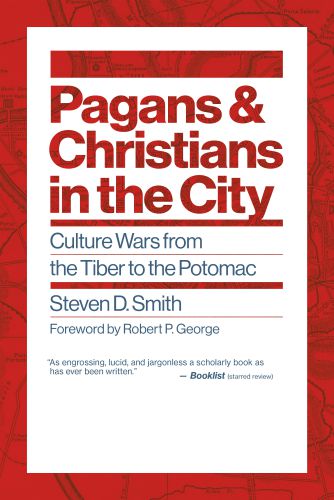
(Unsplash/Frank Busch)
On Monday, I began my review of Steven Smith's Pagans and Christians in the City: Culture Wars from the Tiber to the Potomac, and I finished at the point where Smith, having surveyed ancient paganism, turns his attention to Christianity and why it could not assimilate with the Roman pantheon as other religions had done.
Smith argues that the "crucial difference" was not monotheism versus polytheism, but "the relation of those [pagan] deities to the world and even, we might say, their metaphysical status. … Pagan religion locates the sacred within this world. In that way, paganism can consecrate the world from within; it is religiously relative to an immanent sacred. Judaism and Christianity, by contrast, reflect a transcendent religiosity; they place the sacred, ultimately, outside the world — 'beyond space and time.' "
Setting aside the fact that the ancients had gods who, for example, influenced love and war and tides, trying to make sense of the mystery of the human person and an often hostile nature, a kind of low flying transcendence, has Smith considered the Christian doctrine of the incarnation?
It would be wrong to say that the genius of Christianity and of Judaism is that they recognize the need for a God who is both present and absconding. Genius is a human attribute, and this insight into the Godhead was revealed to us, first in a burning bush and later in a stable in Bethlehem. But it is part of the genius of Catholicism's intellectual tradition that it tends toward the both/and rather than the either/or. Smith rarely cautions the reader that his binary categories are porous. That would not help this culture warrior rile up the troops.
This misunderstanding of the very essence of Judaism and Christianity would not be a problem if Smith did not make this distinction between an immanent religion and a transcendent one the key frame for all that follows. Such a confused framing of his central thesis makes it unsurprising that additional problems follow. Smith observes that "Christians (and also Jews) effectively undid the pagan sacralization of the world, and instead effected a 'desanctification of nature' as [Rabbi] Heschel explained."
Yet we use bread, water and oil in our sacraments, and Passover is commemorated with bitter herbs. Don't get me started on the holy wells in Ireland or the cults of some saints. To be fair, he later observes that "many pagan notions and practices managed to become baptized, so to speak," but he doesn't let this observation unsettle his thesis. The many instances of Christian immanentism receive only a couple of paragraphs.
Advertisement
After quoting Tertullian's request that Christians be treated as good subjects, as were those who adhered to other religions, Smith writes: "Had he been preternaturally prescient, Tertullian might have tried to phrase his proposal in Rawlsian terms." This crosses the line from interesting cross-cultural observation into the morass of nonsensical historical anachronism.
Smith's lack of historical fluency is soon attaining ridiculous proportions.
"Christianity had its own, different resources for permitting or accommodating various beliefs and religiosities, but again there were limits (as would become apparent after Christianity became the preferred religion of the empire)," he writes. "In the long run, Christian dualism — or its commitment to two cities, each with its proper jurisdiction — would evolve into acceptance of a 'separation of church and state' that has functioned to permit a vast diversity of faiths and antifaiths to coexist more or less peacefully. But it would take centuries for that kind of separation to develop. And whether it can survive the erosion or rejection of its Christian foundations remains uncertain."
Oh, is that how it happened? Smith is wrong about early Christianity as he is about early modern Christianity. Alongside every dualistic impulse in the Pauline epistles and the church fathers, there are several insistences to the contrary. Consider Colossians 1:16 ("In Him all things were created") or John 1:3 ("Through Him all things were made") and the Eastern Church fathers for whom dualism was anathema and whose sense of awe before God's gracious self-revelation would find itself at the center of the renewal of 20th century ressourcement theology. After Smith consults Gaudium et Spes 22 ("The truth is that only in the mystery of the incarnate Word does the mystery of man take on light"), so much for triumphant dualism.

I read a lot of books that strike me as foolish. On page 244 and following, Smith shifts from foolish to something more regrettable. Only someone blinded by his own prejudices, or simply dishonest, would write this:
In that respect, though, modern paganism is not so very different from the ancient paganism of the educated classes, who likewise regarded the myths as "lying fables" and often viewed the gods as symbols of a spiritual reality. Primarily, "modern paganism" would be a modern variation on the kind of immanent religiosity or "philosophical paganism" expounded by the character Balbus in Cicero's dialogue on the gods (and by Cicero himself, at least according to his own profession).
The obvious contemporary reiteration of the idea that we should support the gods, even though we think they are fables, are not the Barbara Ehrenreichs and Ronald Dworkins* of the world, as Smith suggests. That kind of rank hypocrisy is most obvious in those believers who seek to have the Bible taught in the public schools because of its historical significance, or are willing to surround the baby Jesus with Santa and his elves in order to get a crèche onto public land. I agree that it is impossible to understand Western history if you are ignorant of the Bible, but third graders do not really do historiography yet, and historical awareness is not the real objective of the "get the Bible back in public schools" brigade.
Smith observes that "for someone like Barbara Ehrenreich, the Other or the Presence glows through the world in 'all its countless manifestations.' " My marginal note reads: "Or for de Lubac or Levinas, no?" He continues: "This would appear to be a modern variation on Balbus's declaration that 'the universe is god.' " Maybe it is just an acknowledgement, common in post-modernism, that the gods of pure reason have been found wanting and that secularism has come to understand there is a mystery about life and the cosmos, even though they do not, in any meaningful sense, divinize that cosmos.
In the end, Smith's blindness, willful or otherwise, is part of the typical "glass is always half empty" quality to conservative culture warrior arguments. His binary framing of complex cultural issues is the stuff of bumper stickers: "On one side of the divide, proponents favor a conception of sexual morality that is discernibly aligned with Christian or, more generally, biblical understandings."
Does adherence to a Christian or biblical moral view necessarily place one exclusively on a particular side in the culture wars? Would different views produce a different alignment? Or is there really only one? These kinds of questions haunt the last half of the volume. This book, so promising in its beginning, turns out to be another screed in which the metaphors, sweeping and simplistic, darken the issues at stake instead of enlightening them.
[Michael Sean Winters covers the nexus of religion and politics for NCR.]
Editor's note: Don't miss out on Michael Sean Winters' latest. Sign up and we'll let you know when he publishes new Distinctly Catholic columns.
* This name has been corrected from an earlier version.






